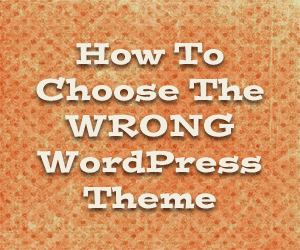 What’s the best WordPress theme?
What’s the best WordPress theme?
That’s a question that you see thrown out regularly.
Before you go further, know that there is no such thing as the best theme (or plugin) for that matter.
However, there are best themes or plugins for the context of what you want to do.
When you choose your themes, be mindful of these and make sure you don’t follow them.
Use An Unsupported Theme
This is rather tough. All theme developers start somewhere, but your business (or money making blog) is not the place to experiment with unproven themes. Security is an issue yes but also, if few people know about and use it, the tougher it is for you to get help, especially on a free theme where support is never guaranteed.
Choose Themes That Are Too Feature Rich
There’s a reason WordPress has plugins and themes. Some things are better left for plugins and others for themes. For example, a theme for food sites. There are plenty of gorgeous themes that do this well.
The moment the theme includes ways for you to create recipe pages, it’s entering plugin territory.
This can be done using custom post types or custom meta content. While the content is still in your database, there is no way to get it out unless you stick with the theme or hire a developer to write a plugin to extract that content so you can use it. That could get expensive.
There’s no law against this, but because this content is tied to the theme, you can never switch your theme without losing your content.
Good for the theme designers, not for you.
Don’t Verify Your Theme
Free themes from unknown sources are notorious for nasty code. Some include secret links to awful sites, some carry virus payloads that help the hacker spread their disease. Others are not malicious but are sneaky; slipping ads in places you don’t expect. Then there are some who are clean on the outside but incessantly bug you through the admin panel with notices you cannot hide or dismiss.
Using Themes That Rely Heavily on Shortcodes
Like themes that include plugin-like functionality, too much shortcode reliance makes it difficult for you to switch to a better, cleaner or a more suitable theme at a later time. Once you activate another theme, your site will be littered with ugly shortcodes in your posts that make no sense to your visitors.
Most times, choosing a theme is not a huge exercise. Especially if you’ve been around the block a few times. If you tend to build sites regularly or like to change things up once in a while, find solid foundational themes with many variations and stick with them. Any one you choose from folks like StudioPress, iThemes, or WooThemes are a great choice.